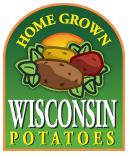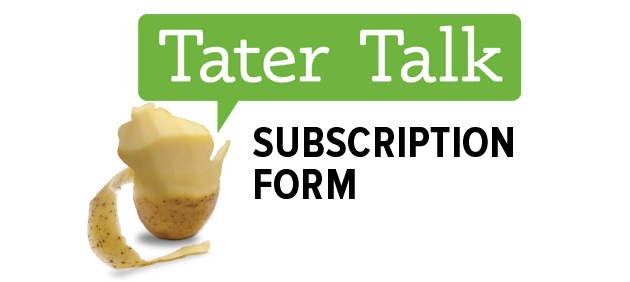Tater Talk Archives
Past Issues
Special Edition - July 10, 2020 Special Edition - May 14, 2020 Special Edition - October 6, 2020 Volume 11, Issue 1 | January 4, 2019 Volume 11, Issue 13 | March 29, 2019 Volume 11, Issue 15 | April 12, 2019 Volume 11, Issue 16 | April 19, 2019 Volume 11, Issue 18 | May 3, 2019 Volume 11, Issue 2 | January 11, 2019 Volume 11, Issue 20 | May 17, 2019 Volume 11, Issue 21 | May 24, 2019 Volume 11, Issue 23 | June 14, 2019 Volume 11, Issue 29 | July 19, 2019 Volume 11, Issue 3 | January 18, 2019 Volume 11, Issue 30 | July 26, 2019 Volume 11, Issue 31 | August 2, 2019 Volume 11, Issue 32 | August 9, 2019 Volume 11, Issue 34 | August 23, 2019 Volume 11, Issue 35 | August 30, 2019 Volume 11, Issue 36 | September 6, 2019 Volume 11, Issue 37 | September 13, 2019 Volume 11, Issue 38 | September 20, 2019 Volume 11, Issue 39 | September 27, 2019 Volume 11, Issue 40 | October 4, 2019 Volume 11, Issue 41 | October 11, 2019 Volume 11, Issue 42 | October 18, 2019 Volume 11, Issue 43 | October 25, 2019 Volume 11, Issue 44 | November 1, 2019 Volume 11, Issue 45 | November 8, 2019 Volume 11, Issue 46 | November 15, 2019 Volume 11, Issue 47 | November 22, 2019 Volume 11, Issue 48 | November 27, 2019 Volume 11, Issue 49 | December 6, 2019 Volume 11, Issue 5 | February 1, 2019 Volume 11, Issue 50 | December 13, 2019 Volume 11, Issue 51 | December 20, 2019 Volume 11, Issue 52 | December 27, 2019 Volume 11, Issue 7 | February 15, 2019 Volume 12, Issue 1 | January 3, 2020 Volume 12, Issue 10 | March 6, 2020 Volume 12, Issue 11 | March 13, 2020 Volume 12, Issue 12 | March 13, 2020 Volume 12, Issue 12 | March 20, 2020 Volume 12, Issue 13 | March 23, 2020 Volume 12, Issue 14 | March 27, 2020 Volume 12, Issue 15 | March 31, 2020 Volume 12, Issue 16 | April 3, 2020 Volume 12, Issue 17 | April 7, 2020 Volume 12, Issue 18 | April 10, 2020 Volume 12, Issue 19 | April 14, 2020 Volume 12, Issue 2 | January 10, 2020 Volume 12, Issue 20 | April 17, 2020 Volume 12, Issue 21 | April 21, 2020 Volume 12, Issue 22 | April 24, 2020 Volume 12, Issue 23 | April 28, 2020 Volume 12, Issue 24 | May 1, 2020 Volume 12, Issue 25 | May 5, 2020 Volume 12, Issue 26 | May 8, 2020 Volume 12, Issue 27 | May 12, 2020 Volume 12, Issue 28 | May 15, 2020 Volume 12, Issue 29 | May 19, 2020 Volume 12, Issue 3 | January 17, 2020 Volume 12, Issue 36 | June 16, 2020 Volume 12, Issue 37 | June 19, 2020 Volume 12, Issue 38 | June 23, 2020 Volume 12, Issue 39 | June 26, 2020 Volume 12, Issue 4 | January 24, 2020 Volume 12, Issue 40 | June 30, 2020 Volume 12, Issue 41 | July 3, 2020 Volume 12, Issue 42 | July 7, 2020 Volume 12, Issue 43 | July 10, 2020 Volume 12, Issue 44 | July 14, 2020 Volume 12, Issue 44 | July 17, 2020 Volume 12, Issue 45 | July 21, 2020 Volume 12, Issue 46 | July 24, 2020 Volume 12, Issue 47 | July 28, 2020 Volume 12, Issue 48 | July 31, 2020 Volume 12, Issue 49 | August 4, 2020 Volume 12, Issue 5 | January 31, 2020 Volume 12, Issue 51 | August 11, 2020 Volume 12, Issue 52 | August 14, 2020 Volume 12, Issue 53 | August 18, 2020 Volume 12, Issue 54 | August 21, 2020 Volume 12, Issue 55 | August 25, 2020 Volume 12, Issue 56 | August 28, 2020 Volume 12, Issue 57 | September 1, 2020 Volume 12, Issue 58 | September 4, 2020 Volume 12, Issue 59 | September 8, 2020 Volume 12, Issue 6 | February 7, 2020 Volume 12, Issue 60 | September 11, 2020 Volume 12, Issue 62 | September 18, 2020 Volume 12, Issue 63 | September 22, 2020 Volume 12, Issue 64 | September 25, 2020 Volume 12, Issue 65 | September 29, 2020 Volume 12, Issue 66 | October 2, 2020 Volume 12, Issue 67 | October 6, 2020 Volume 12, Issue 68 | October 9, 2020 Volume 12, Issue 69 | October 13, 2020 Volume 12, Issue 7 | February 14, 2020 Volume 12, Issue 70 | October 16, 2020 Volume 12, Issue 71 | October 20, 2020 Volume 12, Issue 72 | October 23, 2020 Volume 12, Issue 73 | October 27, 2020 Volume 12, Issue 74 | October 30, 2020 Volume 12, Issue 75 | November 3, 2020 Volume 12, Issue 76 | November 6, 2020 Volume 12, Issue 77 | November 10, 2020 Volume 12, Issue 78 | November 13, 2020 Volume 12, Issue 79 | November 17, 2020 Volume 12, Issue 8 | February 21, 2020 Volume 12, Issue 80 | November 20, 2020 Volume 12, Issue 81 | November 24, 2020 Volume 12, Issue 82 | December 1, 2020 Volume 12, Issue 83 | December 4, 2020 Volume 12, Issue 84 | December 8, 2020 Volume 12, Issue 85 | December 11, 2020 Volume 12, Issue 86 | December 15, 2020 Volume 12, Issue 87 | December 18, 2020 Volume 12, Issue 88 | December 22, 2020 Volume 12, Issue 89 | December 29, 2020 Volume 12, Issue 9 | February 28, 2020 Volume 13, Issue 1 | January 5, 2021 Volume 13, Issue 10 | February 5, 2021 Volume 13, Issue 11 | February 9, 2021 Volume 13, Issue 12 | February 12, 2021 Volume 13, Issue 13 | February 16, 2021 Volume 13, Issue 14 | February 19, 2021 Volume 13, Issue 15 | February 23, 2021 Volume 13, Issue 16 | February 26, 2021 Volume 13, Issue 17 | March 2, 2021 Volume 13, Issue 18 | March 5, 2021 Volume 13, Issue 19 | March 9, 2021 Volume 13, Issue 2 | January 8, 2021 Volume 13, Issue 20 | March 12, 2021 Volume 13, Issue 21 | March 16, 2021 Volume 13, Issue 22 | March 19, 2021 Volume 13, Issue 23 | March 23, 2021 Volume 13, Issue 24 | March 26, 2021 Volume 13, Issue 25 | March 30, 2021 Volume 13, Issue 26 | April 2, 2021 Volume 13, Issue 27 | April 6, 2021 Volume 13, Issue 28 | April 9, 2021 Volume 13, Issue 29 | April 13, 2021 Volume 13, Issue 3 | January 12, 2021 Volume 13, Issue 30 | April 16, 2021 Volume 13, Issue 31 | April 20, 2021 Volume 13, Issue 32 | April 23, 2021 Volume 13, Issue 33 | April 30, 2021 Volume 13, Issue 34 | May 7, 2021 Volume 13, Issue 35 | May 14, 2021 Volume 13, Issue 36 | May 21, 2021 Volume 13, Issue 37 | May 28, 2021 Volume 13, Issue 38 | June 4, 2021 Volume 13, Issue 39 | June 11, 2021 Volume 13, Issue 4 | January 15, 2021 Volume 13, Issue 40 | June 17, 2021 Volume 13, Issue 41 | June 25, 2021 Volume 13, Issue 42 | July 2, 2021 Volume 13, Issue 43 | July 9, 2021 Volume 13, Issue 44 | July 16, 2021 Volume 13, Issue 45 | July 23, 2021 Volume 13, Issue 46 | July 30, 2021 Volume 13, Issue 47 | August 6, 2021 Volume 13, Issue 48 | August 13, 2021 Volume 13, Issue 49 | August 20, 2021 Volume 13, Issue 5 | January 19, 2021 Volume 13, Issue 50 | August 27, 2021 Volume 13, Issue 51 | September 3, 2021 Volume 13, Issue 52 | September 10, 2021 Volume 13, Issue 53 | September 17, 2021 Volume 13, Issue 54 | September 24, 2021 Volume 13, Issue 55 | October 1, 2021 Volume 13, Issue 56 | October 8, 2021 Volume 13, Issue 57 | October 15, 2021 Volume 13, Issue 58 | October 22, 2021 Volume 13, Issue 59 | October 29, 2021 Volume 13, Issue 6 | January 22, 2021 Volume 13, Issue 60 | November 5, 2021 Volume 13, Issue 61 | November 12, 2021 Volume 13, Issue 62 | November 19, 2021 Volume 13, Issue 63 | November 24, 2021 Volume 13, Issue 64 | December 3, 2021 Volume 13, Issue 65 | December 10, 2021 Volume 13, Issue 66 | December 17, 2021 Volume 13, Issue 67 | December 23, 2021 Volume 13, Issue 68 | December 30, 2021 Volume 13, Issue 7 | January 26, 2021 Volume 13, Issue 8 | January 29, 2021 Volume 13, Issue 9 | February 2, 2021 Volume 14, Issue 1 | January 7, 2022 Volume 14, Issue 10 | March 11, 2022 Volume 14, Issue 11 | March 18, 2022 Volume 14, Issue 12 | March 25, 2022 Volume 14, Issue 13 | April 1, 2022 Volume 14, Issue 14 | April 8, 2022 Volume 14, Issue 15 | April 15, 2022 Volume 14, Issue 16 | April 22, 2022 Volume 14, Issue 17 | April 29, 2022 Volume 14, Issue 18 | May 6, 2022 Volume 14, Issue 19 | May 13, 2022 Volume 14, Issue 2 | January 14, 2022 Volume 14, Issue 20 | May 20, 2022 Volume 14, Issue 21 | May 27, 2022 Volume 14, Issue 22 | June 3, 2022 Volume 14, Issue 23 | June 10, 2022 Volume 14, Issue 24 | June 17, 2022 Volume 14, Issue 25 | June 24, 2022 Volume 14, Issue 26 | July 1, 2022 Volume 14, Issue 27 | July 8, 2022 Volume 14, Issue 28 | July 15, 2022 Volume 14, Issue 29 | July 22, 2022 Volume 14, Issue 3 | January 21, 2002 Volume 14, Issue 30 | July 29, 2022 Volume 14, Issue 31 | August 5, 2022 Volume 14, Issue 32 | August 12, 2022 Volume 14, Issue 33 | August 19, 2022 Volume 14, Issue 34 | August 26, 2022 Volume 14, Issue 35 | September 2, 2022 Volume 14, Issue 36 | September 9, 2022 Volume 14, Issue 37 | September 16, 2022 Volume 14, Issue 38 | September 23, 2022 Volume 14, Issue 39 | September 30, 2022 Volume 14, Issue 4 | January 28, 2022 Volume 14, Issue 40 | October 7, 2022 Volume 14, Issue 41 | October 14, 2022 Volume 14, Issue 42 | October 21, 2022 Volume 14, Issue 43 | October 28, 2022 Volume 14, Issue 44 | November 4, 2022 Volume 14, Issue 45 | November 11, 2022 Volume 14, Issue 46 | November 18, 2022 Volume 14, Issue 47 | November 23, 2022 Volume 14, Issue 48 | December 2, 2022 Volume 14, Issue 49 | December 9, 2022 Volume 14, Issue 5 | February 4, 2022 Volume 14, Issue 50 | December 16, 2022 Volume 14, Issue 51 | December 22, 2022 Volume 14, Issue 52 | December 30, 2022 Volume 14, Issue 6 | February 11, 2022 Volume 14, Issue 7 | February 18, 2022 Volume 14, Issue 8 | February 25, 2022 Volume 14, Issue 9 | March 4, 2022 Volume 15, Issue 1 | January 6, 2023 Volume 15, Issue 10 | March 10, 2023 Volume 15, Issue 11 | March 17, 2023 Volume 15, Issue 12 | March 24, 2023 Volume 15, Issue 13 | March 31, 2023 Volume 15, Issue 14 | April 7, 2023 Volume 15, Issue 15 | April 14, 2023 Volume 15, Issue 16 | April 21, 2023 Volume 15, Issue 17 | April 28, 2023 Volume 15, Issue 18 | May 5, 2023 Volume 15, Issue 19 | May 12, 2023 Volume 15, Issue 2 | January 13, 2023 Volume 15, Issue 20 | May 19, 2023 Volume 15, Issue 21 | May 26, 2023 Volume 15, Issue 22 | June 2, 2023 Volume 15, Issue 23 | June 9, 2023 Volume 15, Issue 24 | June 16, 2023 Volume 15, Issue 25 | June 23, 2023 Volume 15, Issue 26 | June 30, 2023 Volume 15, Issue 27 | July 7, 2023 Volume 15, Issue 28 | July 14, 2023 Volume 15, Issue 29 | July 21, 2023 Volume 15, Issue 3 | January 20, 2023 Volume 15, Issue 30 | July 28, 2023 Volume 15, Issue 31 | August 4, 2023 Volume 15, Issue 32 | August 11, 2023 Volume 15, Issue 33 | August 18, 2023 Volume 15, Issue 34 | August 25, 2023 Volume 15, Issue 35 | September 1, 2023 Volume 15, Issue 36 | September 8, 2023 Volume 15, Issue 37 | September 15, 2023 Volume 15, Issue 38 | September 22, 2023 Volume 15, Issue 39 | September 29, 2023 Volume 15, Issue 4 | January 27, 2023 Volume 15, Issue 40 | October 6, 2023 Volume 15, Issue 41 | October 13, 2023 Volume 15, Issue 42 | October 20, 2023 Volume 15, Issue 43 | October 27, 2023 Volume 15, Issue 44 | November 3, 2023 Volume 15, Issue 45 | November 10, 2023 Volume 15, Issue 46 | November 17, 2023 Volume 15, Issue 47 | November 22, 2023 Volume 15, Issue 48 | December 1, 2023 Volume 15, Issue 49 | December 8, 2023 Volume 15, Issue 5 | February 3, 2023 Volume 15, Issue 50 | December 15, 2023 Volume 15, Issue 51 | December 22, 2023 Volume 15, Issue 52 | December 29, 2023 Volume 15, Issue 6 | February 10, 2023 Volume 15, Issue 7 | February 17, 2023 Volume 15, Issue 8 | February 24, 2023 Volume 15, Issue 9 | March 3, 2023 Volume 16, Issue 1 | January 5, 2024 Volume 16, Issue 10 | March 8, 2024 Volume 16, Issue 11 | March 15, 2024 Volume 16, Issue 12 | March 22, 2024 Volume 16, Issue 13 | March 29, 2023 Volume 16, Issue 14 | April 5, 2024 Volume 16, Issue 15 | April 12, 2024 Volume 16, Issue 16 | April 19, 2024 Volume 16, Issue 2 | January 12, 2024 Volume 16, Issue 3 | January 19, 2024 Volume 16, Issue 4 | January 26, 2024 Volume 16, Issue 5 | February 2, 2024 Volume 16, Issue 6 | February 9, 2024 Volume 16, Issue 7 | February 16, 2024 Volume 16, Issue 8 | February 23, 2024 Volume 16, Issue 9 | March 1, 2024


